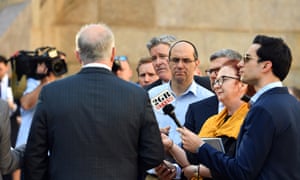Our coverage of the biggest event of our lives is a defining challenge for the news media
The news rolls in like waves. One unfathomably huge development crashing on another. President Donald Trump has shut US borders. Now Australia is closed to foreigners too. Scott Morrison is spending billions. The surplus is history, a recession now inevitable. The graph of confirmed cases soars. The death count climbs. The job losses rise. We were allowed to attend the football, then only smaller gatherings, now we have to measure the space between us and other human beings, soon there may be localised lock downs. Daily life is shutting down, closing in, to makeshift home offices and socially distant outings to supermarkets where there’s not much to buy. And that’s just in the last week.
I’m thinking carefully about how Guardian Australia reports on the biggest event of our lives. How do we track these daily convulsions and make sense of how society is shattering and how or when it will recover. Reporting the coronavirus pandemic is a defining challenge and responsibility for the news media. It demands deep consideration.Above all else – as our global editor in chief, Katharine Viner, promised readers this week – we must provide reliable, factual, trustworthy information that holds firm against the conspiracy theories and misinformation swirling through social media. Being part of a global news organisation dedicated to deep factual reporting of this global crisis gives us strength and depth. We will track the best information on the disease and its treatment, question how authorities are handling the crisis, consider how decisions affect everyone, including the vulnerable, and try to understand the social and economic impacts as they strike.
"Given the stakes are quite literally life and death, we must also be able to question those decisions"
But those commitments raise so many more questions.
The official advice did seem chaotic in the early days, it did swing wildly in the course of a day and decisions were insufficiently explained. The government is making huge and difficult decisions in a rapidly changing environment. We have to take that into account. Given the stakes are quite literally life and death, we must also be able to question those decisions.
"Many people seem to be thinking more deeply about their own priorities and those we have as a society"
But we have to consider the implications of those questions at a time when faith in public institutions is already shaky. A deeply polarised country needs to trust and stick with a plan. Yes, politicians may have done much to breed that lack of trust, but there are consequences for everyone if contempt for government undermines the need for a unified and urgent response to public health measures. When does legitimate scrutiny cross the line to become counterproductive? These difficult judgments must be made on a daily basis.
This story is, by definition, terrifying and bewildering, but can the facts be presented in a way that makes them less so? Should we be doing more to precis, summarise and contextualise? Are we at risk of overloading readers with more information than they can possibly process? Beside our live blog, and our news coverage, we are publishing regular Australian coronavirus at a glance summaries, explainers, and a data tracker that shows not just how many cases there are, and how many deaths, but also how many people have recovered. Our Full Story podcast is now focused on the coronavirus crisis and is produced daily. We will continue to try to report on a difficult situation in constructive ways.
We also want to publish stories that help readers through this time, so we’ve launched The good place, a special part of the site to collect positive and practical stories, advice and comfort and tales of humanity and connection as we all try to adjust to social isolation.
As both Gay Alcorn and Brigid Delaney reflected this week, many people seem to be thinking more deeply about their own priorities and those we have as a society as this virus response strips so many parts of our lives away. I suspect we’ll be having these discussions more in coming months.
These are just some of the questions we are considering, because we must fathom this story even though it feels unfathomably large. Readers are turning to Guardian Australia in unprecedented numbers and we will do everything we possibly can to bring you accurate, responsible, thoughtful coverage as we confront this crisis together and find a way through. I’ll be reading all your comments for ideas about how we might do that better.
• Lenore Taylor is the editor of Guardian Australia

No comments:
Post a Comment